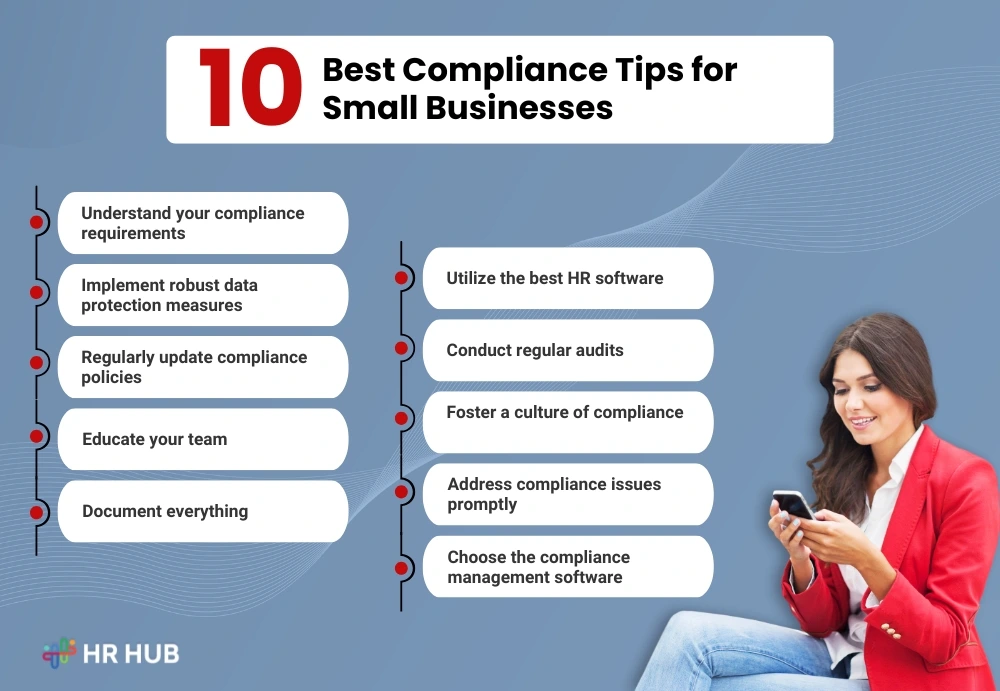Maternity and Paternity Leave in India: Policy, Importance, and Benefits
- Work Culture & Experience


Navigating an intricate maze of compliance regulations is extremely challenging in a world of vibrant small businesses.
Tax laws and employment standards, for example, present varied demands for compliance. Such compliance requires much to support the healthy state of the business environment.
Tools that should be brought into business processes will be integration devices, like compliance management software; such devices minimize pressures that would surface because of that complexity.
These tools ensure that you stay updated with the latest regulations, helping to shield your business from potential legal issues and fines.
Did You Know?
Although India is often highlighted for its business opportunities, the compliance scene tells a different story. A typical small business must navigate over 58 mandatory laws and regulations. Quite the regulatory jungle, isn't it?
Let's dive deeper into each of these compliance tips to provide a more comprehensive understanding that is straightforward and practical for small business owners:
For any small business, the very first step towards managing minimum wage compliance would be to identify the relevant laws and regulations clearly. This requires one to understand the specific requirements based on your industry, whether it is health care, retail, or construction, each governed by a different set of laws.
For example, healthcare may require HIPAA compliance, while financial services may be regulated by FINRA or SEC. Research these areas thoroughly or consult a compliance expert to create a customized compliance checklist for your business.
Data protection should be at the pinnacle of your list of compliance tactics. Start by analyzing and understanding your data, including where you collect and store it and its access level. Implement measures such as encryption, securing user authentication in place, and security training for employees frequently.
Compliance is not a set-it-and-forget-it activity. It needs constant review and revision. Laws change, and so do business practices. Create a routine to regularly review your compliance policies at least once a year or during significant regulatory or business changes.
Use dynamic compliance management software that gives you real-time updates of legal changes and integrates these into your existing policies so you will always comply without constant manual oversight.
Compliance training goes beyond an onboarding session. Instead, it must be an ongoing program that brings periodic refreshers and updates when the laws change. It should teach "why" compliance rather than just how.
Ensure the employees understand the consequences of non-compliance for the business and themselves. Real-life scenarios and interactive content can engage and retain employees much better.
Good documentation practices provide evidence of compliance in case of an audit and are worth their weight in gold when doing internal reviews and identifying areas to improve.
Not only document your policies but also document training sessions, compliance incidents, and how they were handled. Use technology to secure the documents and readily access them without allowing unauthorized individuals to access those documents.
One important factor in choosing an HR software package is that it will be able to handle most of the various facets of compliance related to employee documentation, payroll, benefits, tax compliance, and even new hire reporting and terminations.
Make sure that a particular software points out compliance features like automatic updating for payroll tax rates, integrated time tracking, etc., to adhere to labor law.
Internal audits must complement external audits to ensure an unbiased review of your compliance status. These audits allow you to discover potential compliance issues before they culminate in fines or legal challenges. They also offer a basis to improve your compliance processes. Create an audit schedule and prepare your team to support the audit process to maximize effectiveness.
A compliance culture has to be established from the top. Leadership needs to show that they are committed to compliance in all aspects of regulation and as an integral part of the ethical code of business.
Compliance success stories must be celebrated, and violations must be considered improvement opportunities rather than failures.
Implement a step-by-step procedure for handling any compliance issue. This includes at first, containment of the problem, further investigation to find the root cause, and implementing remedial actions that will ensure its non-repetition.
Speed and transparency in handling compliance issues mitigate risks and preserve stakeholder trust.
The right compliance management software should do more than remind you of deadlines. It should be an all-around platform to help you manage your compliance tasks, from document management to training, audits, and real-time compliance status dashboards.
Compare your options for the best software by looking at their integration capabilities with your current systems and whether they fit your industry-specific needs.
This landscape of compliance is an overwhelming maze. However, there are efficient strategies and tools with which this could be managed. Embrace the power of technology by incorporating advanced compliance and HR solutions.
HR HUB helps organizations stay compliant by automatically updating its system with the latest laws and regulations. This ensures that all HR processes, like hiring, employee benefits, and tax deductions, follow the current legal requirements.
The system also makes payroll easier by calculating accurate tax deductions and benefits for each employee, so businesses don’t have to worry about mistakes. This automation saves time and reduces non-compliance risk, helping organizations manage their HR tasks more efficiently and without stress.
Being proactive about compliance in small business is not just a must; it is an opportunity. Help your business navigate its way to thrive within this complex regulatory environment by arming it with what it needs and turning the compliance challenge into a springboard for growth and stability.